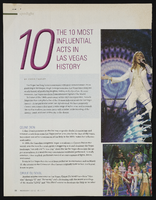Search the Special Collections and Archives Portal
Search Results
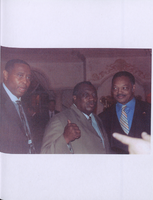
Photograph of Lonnie Wright (left) with William Shack and Rev. Jesse Jackson at Hurricane Katrina fundraiser, circa 2006
Date
Archival Collection
Description
Color photograph of Lonnie Wright (left), William Shack and Rev. Jesse Jackson during a fundraiser for Hurricane Katrina victims who relocated to Las Vegas, circa 2006.
Image
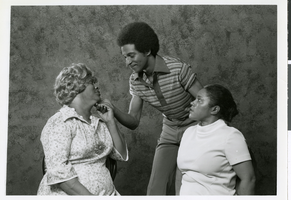
Photograph of Ruth Brown, Donald Lane, and D. D. Cotton at The Meadows Playhouse, circa 1970
Date
Archival Collection
Description
Black and white photograph of a scene staged at The Meadows Playhouse, featuring Ruth Brown, Donald Lane, and D. D. Cotton, circa 1970.
Image
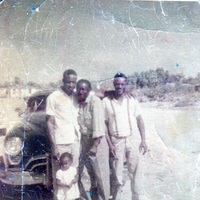
Photograph of Thomas Oliver with his brothers at Four Mile, 1954
Date
Archival Collection
Description
Thomas Oliver, (left) with his brothers, Henry Oliver, (center) and Sonny Boy (James Haley), (right) with an unidentified female child standing in front of an automobile at Four Mile, a little community four miles east of downtown Las Vegas in 1954.
Image
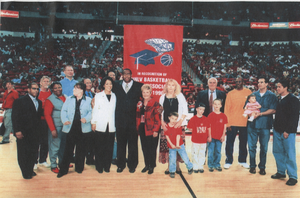
Photograph of UNLV Basketball Alumni Association honoring Lonnie Wright, 1990
Date
Archival Collection
Description
Color photograph of Lonnie Wright (center) being honored for success. He stands with Lois Tarkanian, Sherri Wright, and UNLV President Carol Harter.
Image
Audio recording clip of an interview with Gertrude Toston
Date
Archival Collection
Description
Part of an interview with Gertrude Toston by Claytee White on July 21, 2006. Toston discusses going to work for Western Airlines, at first as a customer service agent in 1967, and then as a flight attendant, while going to school.
Sound
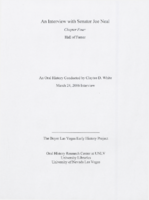
Transcript of fourth interview with Senator Joe Neal by Claytee D. White, March 24, 2006
Date
Archival Collection
Description
Fourth interview in a series of five with Nevada State Senator Joe Neal conducted by Claytee D. White on March 24, 2006. Born in Mounds, Louisiana, in 1935, Neal joined his family in Las Vegas as a young man shortly before serving in the United States Air Force from 1954 to 1958. Following his military service, he earned a bachelor's degree in political science at Southern University in Baton Rouge, Louisiana. Neal continued his education at the Institute of Applied Science in Chicago, Illinois, with postgraduate work in law. From 1973 to 2001, he served in the Nevada Legislature as the Senator from Clark County Senatorial District No. 4. In the fourth interview, Neal shares opinions on capital punishment, southern Nevada utility ownership, the ethics and political influence of the gaming industry, high hospital costs, and the bailout of the Economic Opportunity Board, among other issues. He comments on his induction into the Nevada State Senate Hall of Fame and reviews changes in Las Vegas over the years, particularly in education. Neal closes with thoughts on the future of downtown Las Vegas and the potential impact of planned renovations and high-rise buildings on the Westside.
Text
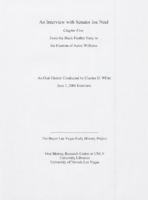
Transcript of fifth interview with Senator Joe Neal by Claytee D. White, June 1, 2006
Date
Archival Collection
Description
Fifth interview in a series of five with Nevada State Senator Joe Neal conducted by Claytee D. White on June 1, 2006. Born in Mounds, Louisiana, in 1935, Neal joined his family in Las Vegas as a young man shortly before serving in the United States Air Force from 1954 to 1958. Following his military service, he earned a bachelor's degree in political science at Southern University in Baton Rouge, Louisiana. Neal continued his education at the Institute of Applied Science in Chicago, Illinois, with postgraduate work in law. From 1973 to 2001, he served in the Nevada Legislature as the Senator from Clark County Senatorial District No. 4. In the fifth interview, Neal recalls the rise of the Black Panther Party and the atmosphere of fear when Patty Hearst was kidnapped by the Symbionese Liberation Army. In closing, Neal relates that voting machines were impounded to protect votes for Aaron Williams, the first black elected to the city council of North Las Vegas, and shares memories of Judge Mendoza.
Text
Anderson, Eddie, 1946-
Eddie Anderson is a political and social activist based out of Reno, Nevada. In the 1990s Eddie Anderson was spokesman for NO HATE (Nevadans Organized for Human, Advocacy, Tolerance and Equality). His work is focused on fundraising for multiple sclerosis, political campaigning for the Democratic Party, and equal rights for minorities and women. Much of his work is concentrated on gay rights and promoting tolerance. Anderson had a career in the 1980s and 1990s as a radio talk-show host where he discussed many of these issues.
Person

